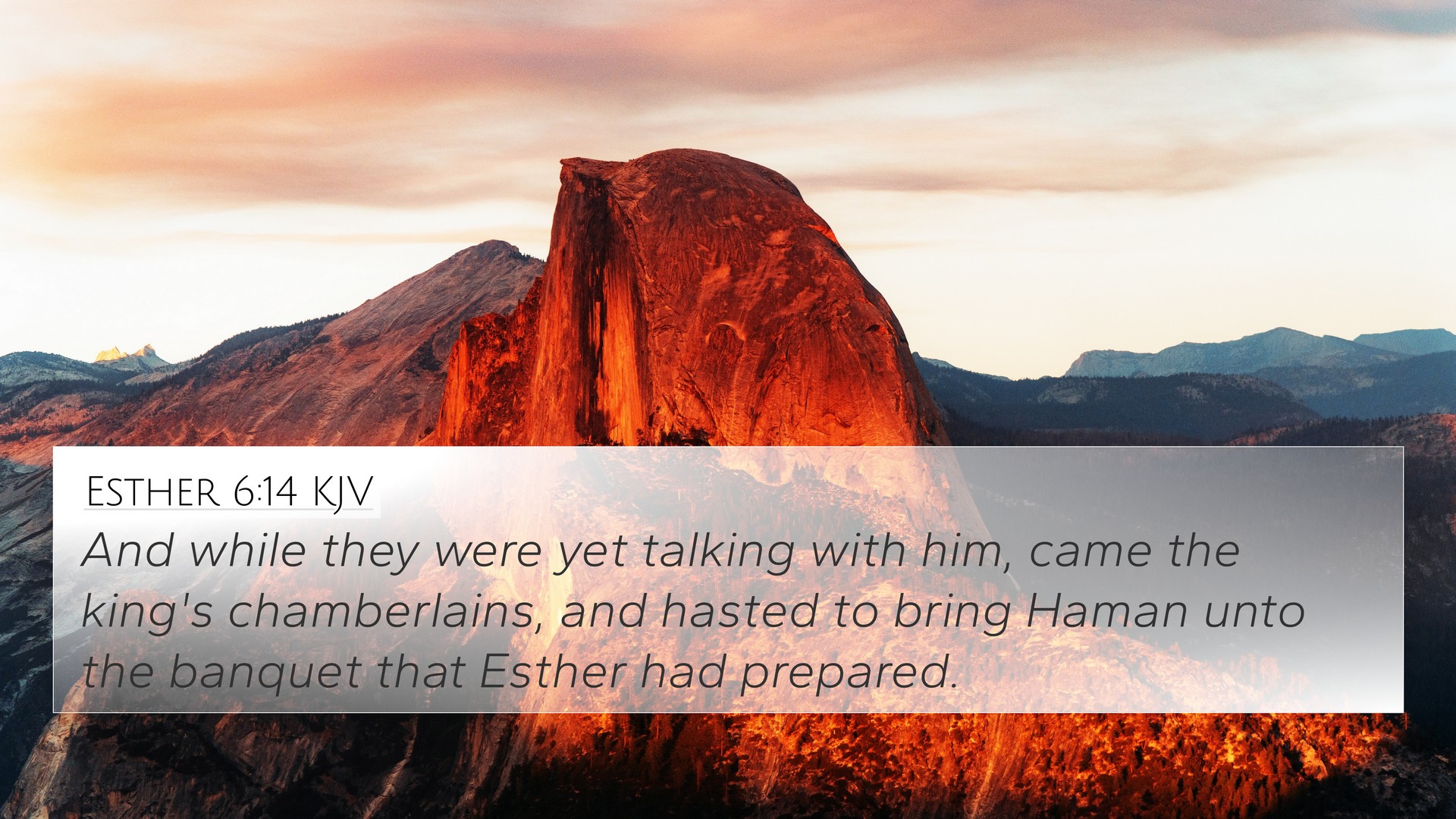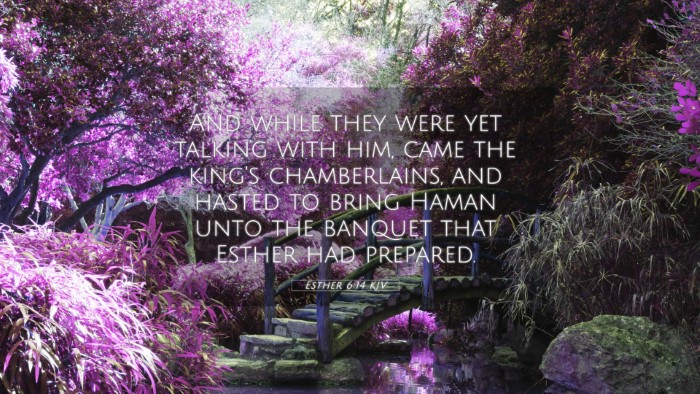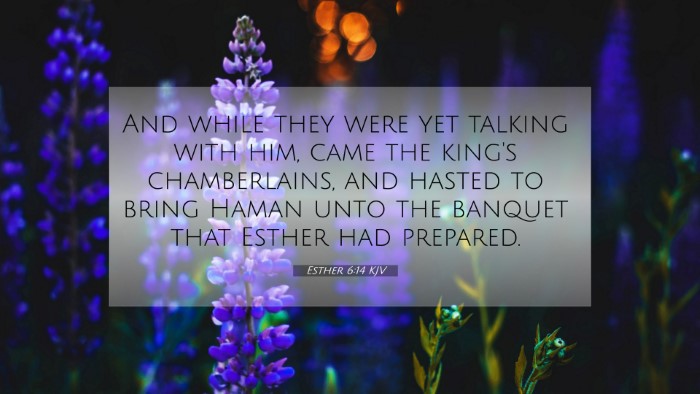Old Testament
Genesis Exodus Leviticus Numbers Deuteronomy Joshua Judges Ruth 1 Samuel 2 Samuel 1 Kings 2 Kings 1 Chronicles 2 Chronicles Ezra Nehemiah Esther Job Psalms Proverbs Ecclesiastes Song of Solomon Isaiah Jeremiah Lamentations Ezekiel Daniel Hosea Joel Amos Obadiah Jonah Micah Nahum Habakkuk Zephaniah Haggai Zechariah MalachiEsther 6:14 Similar Verses
Esther 6:14 Cross References
And while they were yet talking with him, came the king's chamberlains, and hasted to bring Haman unto the banquet that Esther had prepared.
Uncover the Rich Themes and Topics of This Bible Verse
Listed below are the Bible themes associated with Esther 6:14. We invite you to explore each theme to gain deeper insights into the Scriptures.
Esther 6:14 Cross Reference Verses
This section features a detailed cross-reference designed to enrich your understanding of the Scriptures. Below, you will find carefully selected verses that echo the themes and teachings related to Esther 6:14 KJV. Click on any image to explore detailed analyses of related Bible verses and uncover deeper theological insights.
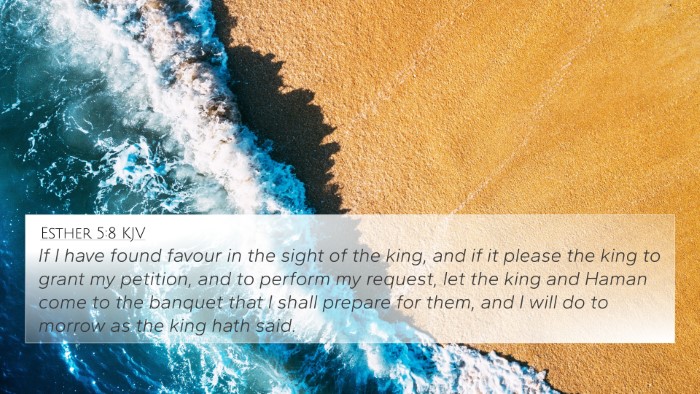
Esther 5:8 (KJV) »
If I have found favour in the sight of the king, and if it please the king to grant my petition, and to perform my request, let the king and Haman come to the banquet that I shall prepare for them, and I will do to morrow as the king hath said.
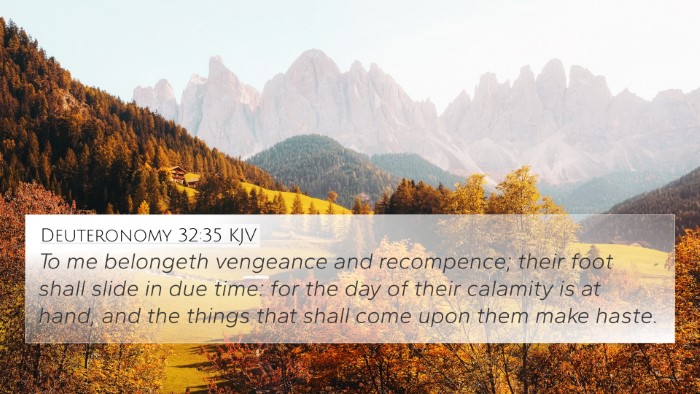
Deuteronomy 32:35 (KJV) »
To me belongeth vengeance and recompence; their foot shall slide in due time: for the day of their calamity is at hand, and the things that shall come upon them make haste.
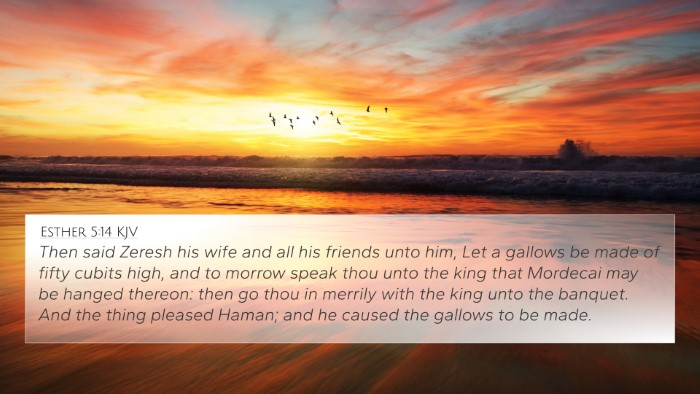
Esther 5:14 (KJV) »
Then said Zeresh his wife and all his friends unto him, Let a gallows be made of fifty cubits high, and to morrow speak thou unto the king that Mordecai may be hanged thereon: then go thou in merrily with the king unto the banquet. And the thing pleased Haman; and he caused the gallows to be made.
Esther 6:14 Verse Analysis and Similar Verses
Understanding Esther 6:14
Esther 6:14: "And while they were yet talking with him, came the king's chamberlains, and hasted to bring Haman unto the banquet that Esther had prepared."
This verse comes at a pivotal moment in the Book of Esther, illustrating the themes of divine timing and justice. Here, we see the urgency of the king’s chamberlains as they bring Haman to a banquet prepared by Esther, which is a significant turning point in the narrative.
Summary of Insights from Public Domain Commentaries
- Matthew Henry: Henry emphasizes the irony in the king's rush to honor Haman, who is blissfully unaware of the danger he is in. This moment represents the complexity of God's providence, where the proud are brought low while the humble are exalted.
- Albert Barnes: Barnes notes the significance of timing in this text. The arrival of the chamberlains, along with Haman’s obliviousness, stresses the important biblical theme of how God orchestrates events to fulfill His purposes, often without the knowledge of the individuals involved.
- Adam Clarke: Clarke discusses the preparations made by Esther. He highlights the spiritual and emotional tension present, not just for Esther but for the entire Jewish people. The upcoming banquet symbolizes a moment of confrontation over Haman’s plans against the Jews.
Biblical Context and Thematic Connections
This verse falls within a crucial narrative that showcases God’s sovereignty, the futility of human pride, and the power of faith and courage that Esther exemplifies. The chapter reflects broader themes found throughout Scripture, such as:
- Divine Justice: God's intervention in the affairs of men, highlighting His authority over those who seek to destroy His people.
- Human Ambition: Haman's rise to power serves as a cautionary tale about pride and ambition that ultimately leads to downfall.
- Courage and Faith: Esther's boldness in approaching the king is a parallel to many biblical figures who demonstrated faith in dire circumstances, such as Daniel or Moses.
Cross-References and Connections Between Bible Verses
Esther 6:14 connects with several other key verses, enhancing its meaning through thematic parallels and shared motifs:
- Proverbs 16:18: "Pride goes before destruction, and a haughty spirit before a fall." - Reflects Haman's prideful mindset.
- Psalm 37:32-33: "The wicked watches for the righteous, and seeks to slay him." - Illustrates the danger Esther and her people face.
- 1 Peter 5:5: "God resists the proud, but gives grace to the humble." - Echoes Esther's humility in contrast to Haman's pride.
- Isaiah 54:17: "No weapon formed against you shall prosper..." - A reminder of God’s protection over His people in times of peril.
- James 4:10: "Humble yourselves before the Lord, and he will exalt you." - Links directly to Esther's character and approach.
- Matthew 23:12: "Whoever exalts himself will be humbled..." - Reflects Haman's impending fall from grace.
- Exodus 14:14: "The LORD will fight for you, and you shall hold your peace." - Portrays God’s assurance to His people, similar to Esther's conviction.
Importance of Cross-Referencing in Biblical Study
Understanding Esther 6:14, as well as other scriptures, can be enhanced through effective cross-referencing. Here are some tools and methods for Bible study:
- Bible Concordance: A reference tool that helps locate specific words and themes throughout the Bible, making it easier to find connections.
- Bible Cross-reference Guide: This can direct readers to related scriptures, enriching their understanding of the texts.
- Cross-referencing Bible Study Methods: Approaches such as thematic studies or character studies allow for deeper examination of scriptures and interconnections.
Conclusion: The Power of Esther 6:14 in Scriptural Context
Esther 6:14 is more than a historical account; it is a demonstration of faith, God's sovereignty, and the timeless principle of divine justice against human pride. By exploring cross-references, we uncover the richness of Biblical themes and the interwoven stories within Scripture. Cross-referencing tools and study methods allow us to link these themes to the greater narrative of salvation history.
